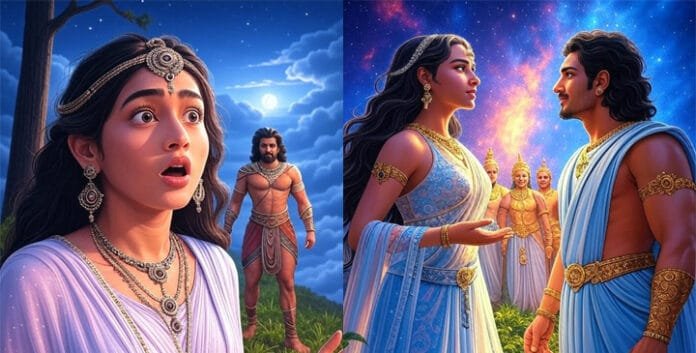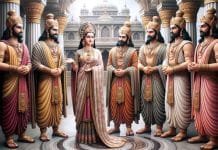INVC NEWS
New Delhi — : The epic of the Mahabharata is filled with tales of valor, love, betrayal, and divine interventions. Among these, one particularly intriguing episode involves the celestial Apsara Urvashi, her infatuation with Arjun, and a curse that turned into a strategic advantage. This tale not only reflects Arjun’s unmatched character but also showcases how even divine wrath can become a boon in disguise.
Arjun’s Ascent to Heaven in Search of Divine Weapons
After years of intense penance and devotion, Arjun was invited to Swarga (Heaven) by his divine father, Indra, the king of the gods. Arjun’s purpose was clear—he sought to gain access to celestial weapons that would aid him in the upcoming war of Dharma, the Kurukshetra War.
In heaven, Arjun demonstrated extraordinary discipline, humility, and bravery, qualities that impressed not only the gods but also the divine beings who resided there. Pleased with Arjun’s spiritual rigor and warrior’s heart, Indradev bestowed upon him numerous divine astras, including the Vajra and other potent weapons. These divine gifts would later become crucial in securing the Pandava victory.
The Enchantment of Urvashi: Heaven’s Fairest Apsara
While Arjun resided in the divine realm, his charm, valor, and intellect captivated many. Among those enchanted by his presence was Urvashi, one of the most celebrated and radiantly beautiful Apsaras of Indra’s court. Known for her grace and allure, Urvashi had captivated gods and mortals alike for eons. However, it was Arjun’s resistance to her beauty that made her desire him even more.
Urvashi approached Arjun with a bold declaration of love, offering herself to him with affection and desire. But Arjun’s response was not what she expected.
A Reverent Rejection That Led to Divine Wrath
Arjun, the epitome of dharma and respect, politely declined Urvashi’s offer, addressing her as a mother figure. He explained that, as the consort of King Pururava, an ancestor of the Pandavas, she was like a mother to him and thus beyond reach in terms of romantic or physical connection.
This response, though dignified and respectful, deeply wounded Urvashi’s pride. In a moment of humiliation and fury, she cursed Arjun to become a kliba, or eunuch, stripping him of his masculinity for a period.
Indra’s Assurance: A Curse with a Hidden Blessing
Shocked by the unexpected turn of events, Arjun sought counsel from Indradev. Indra, ever wise, reassured his son that the curse was temporary and, more importantly, would serve a greater purpose. He informed Arjun that he would regain his original form whenever he wished and that the curse would protect him in the future during a critical moment.
Years Later: The Curse Becomes Arjun’s Shield During Exile
Years passed, and the Pandavas were forced into a 13-year exile, with the last year requiring complete anonymity. If they were recognized during this incognito year, the exile would restart. This was a high-stakes challenge, as Duryodhan had spies placed across the kingdom to uncover their whereabouts.
Here, the curse from Urvashi became Arjun’s greatest shield. Embracing the identity of Brihannala, a eunuch, Arjun entered the service of King Virat under the guise of a dance and music teacher for Princess Uttara.
Arjun as Brihannala: Master of Arts in the Palace of King Virat
Disguised as Brihannala, Arjun transformed his warrior’s grace into an artist’s finesse. He taught Uttara dance, singing, and instrumental music, earning her trust and respect. His transformation was flawless, and not even the sharpest spies of Duryodhan suspected that the famed Pandava warrior was hiding in plain sight.
Arjun’s conduct, knowledge of the arts, and unassuming demeanor allowed him to blend into palace life seamlessly. His composure under scrutiny preserved the sanctity of the exile, fulfilling the Pandavas’ vow and avoiding the risk of another 13-year banishment.
Duryodhan’s Defeat: No Clue of Arjun’s True Identity
Despite Duryodhan’s desperate efforts to discover the Pandavas during their incognito year, he never suspected Brihannala’s true identity. The curse had veiled Arjun’s aura, allowing him to operate under complete anonymity. Even when war loomed and Arjun reclaimed his warrior identity, no trace of his disguise remained. This strategic use of Urvashi’s curse ultimately played a pivotal role in ensuring the Pandavas’ readiness for the battle of Kurukshetra.
Urvashi’s Curse: A Hidden Boon That Changed the Course of History
What initially appeared as a punishment turned into a clever disguise, becoming the most unexpected blessing. Urvashi’s anger, fueled by unrequited love, unknowingly offered Arjun the perfect solution to survive during a time when survival was essential.
The transformation into Brihannala was not just a physical alteration, but a test of Arjun’s restraint, humility, and patience. He adapted to a life far from the battlefield, suppressing his pride and might, only to emerge stronger when the time came.
Conclusion: The Divine Irony of a Curse That Saved a Warrior
This tale from the Mahabharata reveals the multi-layered destiny of heroes like Arjun. A heavenly curse, borne out of divine disappointment, became a shield in exile, a tool for anonymity, and a demonstration of Arjun’s commitment to dharma.
In every aspect, Arjun remained a figure of unwavering resolve, whether on the battlefield or in the palace disguised as a eunuch. His ability to embrace even a curse and turn it into strength reflects the greatness that has made him one of the most revered heroes in Indian mythology.
Urvashi’s curse was not a downfall—it was divine foresight masked in momentary rage, designed by fate to preserve a warrior who would one day change the course of history.
















